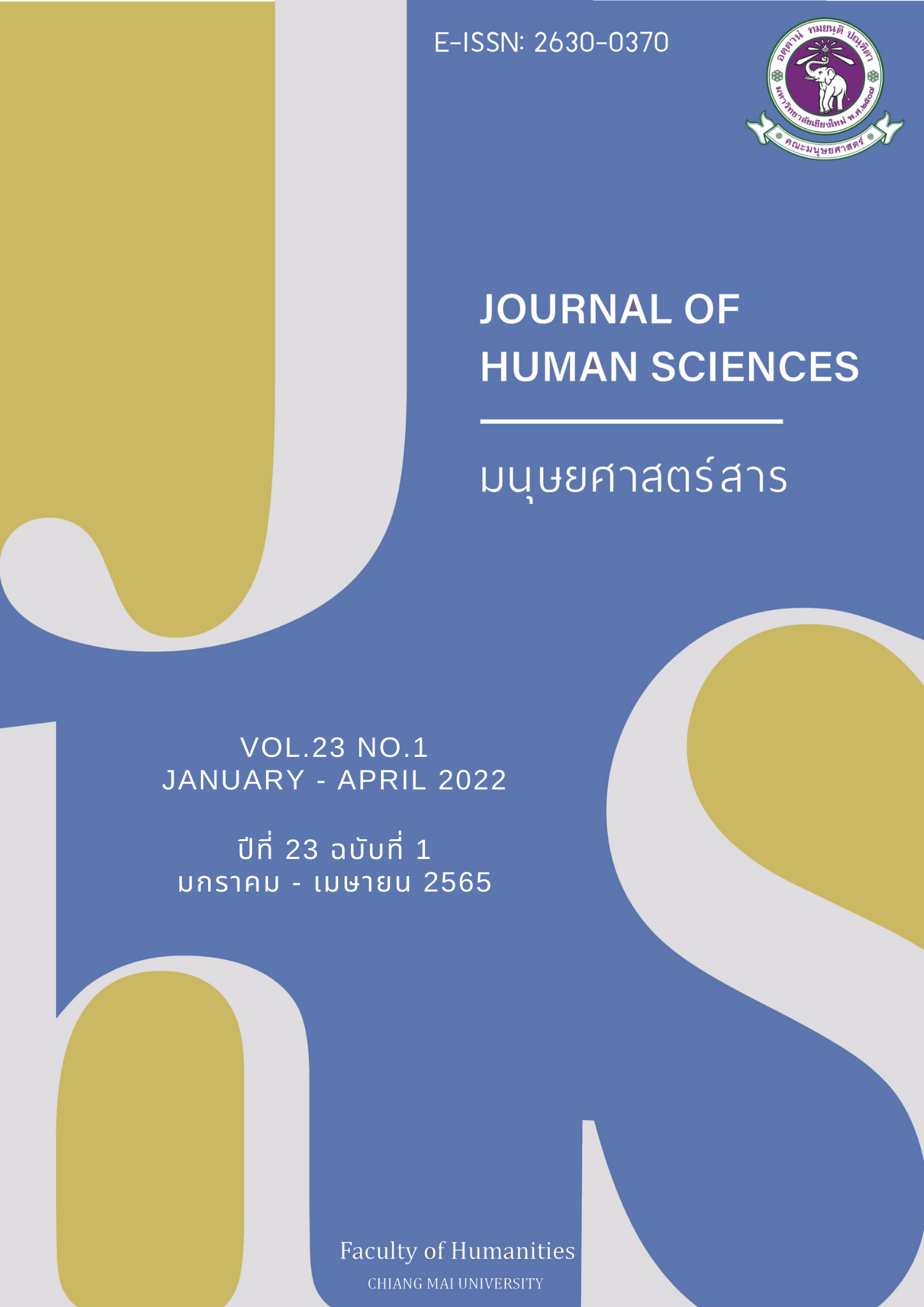ชื่อสถานที่พักในเมืองพาราณสี ประเทศอินเดีย: มุมมองทางอรรถศาสตร์ชาติพันธุ์
Main Article Content
บทคัดย่อ
บทความเรื่อง “ชื่อสถานที่พักในเมืองพาราณสี ประเทศอินเดีย: มุมมองทางอรรถศาสตร์ชาติพันธุ์” มีวัตถุประสงค์เพื่อวิเคราะห์โครงสร้างของชื่อสถานที่พักในเมืองพาราณสี ประเทศอินเดีย และวิเคราะห์วงความหมายของชื่อสถานที่พักในเมืองพาราณสี ประเทศอินเดีย ผู้วิจัยเก็บรวบรวมข้อมูลชื่อสถานที่พักในเมืองพาราณสี ประเทศอินเดีย โดยใช้วิธีค้นหาจากเว็บไซต์ https://www.google.co.th/maps/ @25.3204684,82.8718581,11.5z จำนวนข้อมูลสำหรับการวิเคราะห์มีทั้งหมด 350 แห่ง
ผลการศึกษาพบว่า ด้านโครงสร้างของชื่อสถานที่พักในเมืองพาราณสี ประเทศอินเดีย พบทั้งหมด 2 โครงสร้าง ได้แก่ โครงสร้างเดี่ยว และโครงสร้างขยาย ส่วนด้านด้านวงความหมายของชื่อสถานที่พักในเมืองพาราณสี ประเทศอินเดีย พบทั้งหมด 8 วงความหมาย ได้แก่ วงความหมายที่เกี่ยวกับสิ่งศักดิ์สิทธิ์ วงความหมายที่เกี่ยวกับบุคคลและวงศ์ตระกูล วงความหมายที่เกี่ยวกับสถานที่ วงความหมายที่เกี่ยวกับพิธีกรรม วงความหมายที่เกี่ยวกับความสิริมงคล วงความหมายที่เกี่ยวกับธรรมชาติ วงความหมายที่เกี่ยวกับลักษณะ และวงความหมายที่เกี่ยวกับคุณสมบัติ
Article Details

อนุญาตภายใต้เงื่อนไข Creative Commons Attribution-NonCommercial-NoDerivatives 4.0 International License.
เอกสารอ้างอิง
Benjasri, W. (2015). khanop kan tangchư kho̜ng Khon Thai chưasai India: phap satho̜n thang phasa læ watthanatham [Indian Thai Naming Traditions in Thailand: Characteristics and Culture Reflections]. (Doctor of Philosophy thesis, Mahidol University).
Chaipunya, J. S. (2021). thima læ rupkhian thi plianplæng : ko̜rani sưksa nuaisap phasa bali læ phasa sansakrit thi chai nai kan tangchư [Origins and Written Forms: A Case Study of Pali and Sanskrit Lexemes Used for Naming]. Academic Journal of Humanities and Social Sciences Burapha University, 29 (1), 26-47.
Frake, C. O. (1980). Language and Culture Description. Stanford: Stanford Press.
Heshu, L. (2008). An Ethnosemantic Study of the Mao language. (Doctor of Philosophy thesis, North-Eastern Hills University).
Kaleem, N. (1981). English Loanwords in Tamil: An Ethnosemantic Study. (Doctor of Philosophy thesis, Central Institute of English and Foreign Languages).
Klinaon, A., Hien, S., & Saliphot, K. (2019). chư rongrian nai changwat siam riap prathet Kamphucha: kansưksa tam næo atthasat chattiphan [Names of School in Siem Reap, Cambodia: An Ethnosemantic Study] In Proceedings of the Annual National Conference of Liberal Arts, Thammasat University (pp. 608-624). Bangkok: Thammasat University.
Nomnian, A. (2020). mo̜ranang hoten rongræm ro̜ khwamtai mưang pharanasi sathanthi ro̜ wan khưn su moksa kho̜ng chao India [Hotel of Death in Varanasi]. Retrieved from https://www.silpa-mag.com/culture/article_47836.
Prasatkaew, S., Thammachoto, j., & Areephong, A. (2018). kan tang chư rưapramong phưnban klum khon malayu chaifang thale tawano̜k phaktai to̜nlang [The Naming of Malay Local Fishing Boats in the Eastern Coastal Area of Lower Southern Thailand]. In Proceedings of 56th Kasetsart University Annual Conference: Education, Economics and Business Administration, Humanities and Social Sciences (pp. 758-765). Bangkok: Kasetsart University.
Prasithrathsint, A. (2006). Kwa cha pen nak phasasat [The Making of a Linguist]. Bangkok: Chulalongkorn University Press.
Roungtheera, T. (2019) khrongsang thang atthasat læ waiyakon khong chư ahan Thai thi plæ pen phasa Farangset [Semantic and Grammatical Structures of Thai DishNames Translated into French]. Journal of the faculty of Arts, Silpakorn University, 41 (2), 255-245.
Rungbanjit, W., Rungbanjit, W., Saesen, W., Saepun, W., & Noparit, P. (2019). samruat læ sưksa kan tang chư rankha phasa Chin kho̜ng chao Thai chưasai Chin nai khet amphœ mưang changwat yala. [A Survey and Analysis of the Tradename in Chinese Thais Merchant Shop and Stores in Muang District, Yala Province] (Research Report). Yala: Humanities and Social Sciences, Yala Rajabhat University.
Shabina. (2011). An Ethnosemantic Analysis of The Cultural Lexicon of Kashmiri Language. (Doctor of Philosophy thesis, University of Kashmir).
Sodsongkrit, M. (2012). kansamruat læ sưksa wikhro̜ chư rankha phasa Chin kho̜ng chao Thai chưasai Chin nai khet amphœ mưang changwat Ubon ratchathani [A Survey and Analysis of the Trade Name in Chinese Thais Merchant Shop and Stores in Muang District, Ubon Ratchathani Province]. Journal of Liberal Arts, Ubon Ratchathani University, 8 (2), 60-89.
Srichampa, s. (2015). phra khanet amata thep India su sangkhom Thai nai miti phasa læ watthanatham [Language and Cultural Perspectives of Ganesha Indian Eternal God in Thai Society]. Journal of the faculty of Arts, Silpakorn University, 31 (1), 33-60.
Sumniengngam, S. (2002). laksana phasa thi sadæng khwam plianplæng kho̜ng khwamchưa kieokap sirimongkhon læ kalakini nai chư kho̜ng Khon Thai [Linguistic Characteristics Indicating Change in the Belief in Auspiciousness and Inauspiciousness in Thai Names]. (Doctor of Philosophy thesis, Chulalongkorn University).


